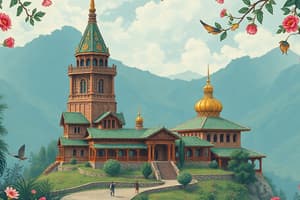Podcast
Questions and Answers
What term was used by the Americans to refer to the Igorot Cordillerans?
What term was used by the Americans to refer to the Igorot Cordillerans?
- Non-Christian tribes (correct)
- Ethnolinguistic classifications
- Mountain people
- National minorities
How were Filipinos born in the Gran Central Cordillera generally known as?
How were Filipinos born in the Gran Central Cordillera generally known as?
- National minorities
- Lowlanders
- Foreigners
- Igorots (correct)
What term was popularized during the Marcos regime to refer to all indigenous peoples of the Philippines?
What term was popularized during the Marcos regime to refer to all indigenous peoples of the Philippines?
- Non-Christian tribes
- Ethnolinguistic groups
- National minorities (correct)
- Mountain people
How did some ethnolinguistic groups prefer to be identified due to the negative connotation of the term 'Igorots'?
How did some ethnolinguistic groups prefer to be identified due to the negative connotation of the term 'Igorots'?
What characterized the cultural uniqueness of each ethnolinguistic group in the Cordillera Administrative Region?
What characterized the cultural uniqueness of each ethnolinguistic group in the Cordillera Administrative Region?
What term had a discriminatory sense during the Marcos regime as it catered to national interests at the expense of the minorities?
What term had a discriminatory sense during the Marcos regime as it catered to national interests at the expense of the minorities?
What term is used in the text to refer to the people belonging to a particular ethnolinguistic group indigenous to the Cordilleras?
What term is used in the text to refer to the people belonging to a particular ethnolinguistic group indigenous to the Cordilleras?
According to Dr. Jesus T. Peralta, why is the term 'tribe' considered inappropriate for the people groups in the Cordilleras?
According to Dr. Jesus T. Peralta, why is the term 'tribe' considered inappropriate for the people groups in the Cordilleras?
What is the more appropriate term suggested in the text to indicate the different groups in the Cordillera Administrative Region?
What is the more appropriate term suggested in the text to indicate the different groups in the Cordillera Administrative Region?
Why does the text mention that 'Cordilleran' is used with respect to the people of the region?
Why does the text mention that 'Cordilleran' is used with respect to the people of the region?
In which context is the term 'tribe' still commonly used according to the text?
In which context is the term 'tribe' still commonly used according to the text?
What does Dr. Jesus T. Peralta's article 'There are no tribes in the Philippines' focus on?
What does Dr. Jesus T. Peralta's article 'There are no tribes in the Philippines' focus on?
What is the main purpose of Section 1 of Article X based on the text?
What is the main purpose of Section 1 of Article X based on the text?
Which group was NOT among the original 8 recognized major ethno-linguistic groups in the Cordillera Administrative Region?
Which group was NOT among the original 8 recognized major ethno-linguistic groups in the Cordillera Administrative Region?
Who signed Executive Order 220 creating the Cordillera Administrative Region?
Who signed Executive Order 220 creating the Cordillera Administrative Region?
How many recognized major ethno-linguistic groups are there in CAR at present?
How many recognized major ethno-linguistic groups are there in CAR at present?
Which group is located in the Eastern Municipalities of Mt. Province?
Which group is located in the Eastern Municipalities of Mt. Province?
Which of the following groups was NOT among the 5 additional groups recognized later in CAR?
Which of the following groups was NOT among the 5 additional groups recognized later in CAR?
Flashcards are hidden until you start studying
Study Notes
Terminology and Identity
- Americans referred to the Igorot Cordillerans as "Negritos"
- Filipinos born in the Gran Central Cordillera were generally known as "Igorots"
- During the Marcos regime, the term "Kakatol" was popularized to refer to all indigenous peoples of the Philippines
- Some ethnolinguistic groups preferred to be identified by their specific group names due to the negative connotation of the term 'Igorots'
Cultural Uniqueness and Terminology
- Each ethnolinguistic group in the Cordillera Administrative Region has its own cultural uniqueness
- The term "Kakatol" had a discriminatory sense during the Marcos regime as it catered to national interests at the expense of minorities
- The term "Igorot" refers to people belonging to a particular ethnolinguistic group indigenous to the Cordilleras
- Dr. Jesus T. Peralta considers the term "tribe" inappropriate for the people groups in the Cordilleras
Alternative Terms and Context
- Dr. Peralta suggests using "ethnolinguistic groups" or "people groups" instead of "tribes"
- The term "Cordilleran" is used with respect to the people of the region
- The term "tribe" is still commonly used in a national or global context
Dr. Peralta's Article and Focus
- Dr. Jesus T. Peralta's article "There are no tribes in the Philippines" focuses on the inappropriateness of the term "tribe" for the people groups in the Cordilleras
Cordillera Administrative Region (CAR)
- Section 1 of Article X aims to recognize and protect the rights of indigenous peoples
- The Cordillera Administrative Region was created by Executive Order 220 signed by President Corazon Aquino
- There are currently 11 recognized major ethno-linguistic groups in CAR
- The group located in the Eastern Municipalities of Mt. Province is the Kalinga
- The group that was NOT among the original 8 recognized major ethno-linguistic groups in CAR is the Gaddang
Studying That Suits You
Use AI to generate personalized quizzes and flashcards to suit your learning preferences.




